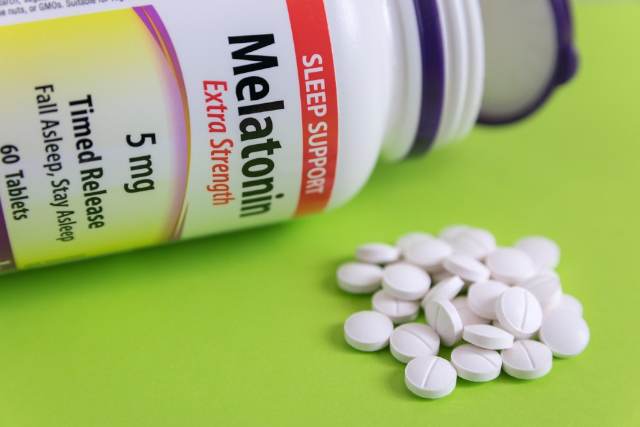The medical and scientific channels on my food newswire can go for two or three weeks without a peep. Then, there are weeks like this one where there’s a flood of fascinating research findings. We’ve skimmed a few of the best off the top of the stack…
 Melatonin: A safe sleep aid for adults, but a harmful drug for kids?
Melatonin: A safe sleep aid for adults, but a harmful drug for kids?
The kids are stressed out
A new study reveals, “Nearly one in five school-aged children and preteens now take melatonin for sleep. And some parents routinely give the hormone to preschoolers.”
“Melatonin is produced naturally in the pineal gland to signal the body that it is time to sleep and regulate its circadian rhythm – the physiological cycle over a 24-hour period.”
Melatonin is a hormone that triggers the release of sleep-inducing substances. It’s classed as a prescription drug in many other countries. But it’s simply a loosely-regulated ‘supplement’ in the US. In Canada, it’s classed as a ‘natural health product’.
But there is no experimental evidence to show that melatonin supplementation is safe for children. And stats show that calls to poison control centres about melatonin have increased sharply lately.
“We hope this paper raises awareness for parents and clinicians, and sounds the alarm for the scientific community,” says study lead author Dr. Lauren Hartstein, a postdoctoral fellow in the Sleep and Development Lab at Colorado University Boulder. “We are not saying that melatonin is necessarily harmful to children. But much more research needs to be done before we can state with confidence that it is safe for kids to be taking long-term.”
Broccoli Sprouts for bowel health
Researchers reporting in mSystems, a journal of the American Society for Microbiology, say ensuring a lifetime free of Inflammatory Bowl Disease might be as easy as feeding kids broccoli sprouts.
It’s just in the mouse-study stage at the moment, but the implications are clear.
What they did
Researchers set up 4 groups of identical mice, one two weeks old and the other 7 weeks old. They separated each group into two sub-groups; one fed broccoli sprouts and the other not. And they assessed the results after 3 weeks.
What they found
“First, we show that the mice that ate the broccoli sprout […] diet had a greater concentration of an anti-inflammatory metabolite called sulforaphane in their blood. Even though our mice were immunocompromised and had colitis, this increase in sulforaphane protected them from severe disease symptoms like weight loss, fecal blood and diarrhea,” said Dr. Lola Holcomb, lead study report author and a PhD. Candidate in the Graduate School of Biomedical Sciences and Engineering at the University of Maine.
The takeaway
The report concludes: “[B]roccoli sprouts, which are easily grown and found in grocery stores, could be used as a treatment strategy for patients with IBD.”
Of course, much more research will be needed before it’s confirmed that the Broccoli sprouts effect translates to humans.
Cutting even a little salt can lower BP
We’ve known for years that excess salt is bad for our blood pressure. But new research shows we can lower BP by reducing excess salt intake by a surprisingly small amount a day.
Says the study Summary: “Nearly everyone can lower their blood pressure, even people currently on blood pressure-reducing drugs, by lowering their sodium intake […] It found 70-75 percent of all people, regardless of whether they are already on blood pressure medications or not, are likely to see a reduction in their blood pressure if they lower the sodium in their diet.”
“We found that 70-75 percent of all people, regardless of whether they are already on blood pressure medications or not, are likely to see a reduction in their blood pressure if they lower the sodium in their diet,” said co-principal investigator Dr. Norrina Allen, professor of preventive medicine at Northwestern University Feinberg School of Medicine.
Most Western countries have established a recommendation that adults consume no more than 1,500 mg of salt per day. Alas, most folks in Europe and North America routinely exceed the recommended salt ceiling. A heavy reliance on fast food and processed food, and a heavy hand on the salt shaker are have been identified as the prime suspects in this dietary crime.
But the study shows that anybody should be able to lower their blood pressure significantly simply by cutting their daily salt intake by as little as 1 teaspoon. I dare you to try!
~ Maggie J.

